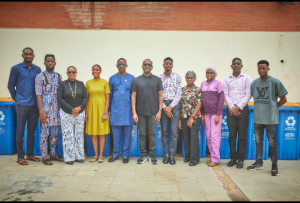Lagos empowers 1,750 farmers with agricultural inputs

Lagos State Governor, Babajide Sanwo-Olu on Thursday said the state government will continue to provide necessary assistance and advisory services to farmers in order to increase food production in the State.
Sanwo-Olu gave the commitment in Lagos at the Flag-off of the 2019 Agricultural Value Chains Empowerment programme wherein 1,750 Agricultural Value Chains Actors were empowered with various agricultural productive assets and inputs.
“In spite of the global climate change which constitutes a major challenge to food security, our government will continue to provide necessary assistance and advisory services to farmers to increase food production in the State,” the governor opined.

The governor, who was represented by his deputy, Dr. Obafemi Hamzat explained that the provision of adequate socio-economic infrastructure, on a sustainable basis, to meet the needs of the growing population would continue to receive the state hovernment’s priority attention.
He called for adequate preparation in order to meet the challenges of a growing population and reinforced the need for a new and integrated approach to food production and agro-allied business in order to enhance and sustain food security.
“As we all know, Lagos State is the commercial hub of Nigeria and the sub region. It has been ranked as the 5th largest economy in Africa and the fastest growing city in the world in terms of economy and population. Therefore, the provision of adequate socio-economic infrastructure, on a sustainable basis, to meet the needs of the growing population must continue to receive our priority attention.
“We must, therefore, prepare to adequately meet the challenges and reinforce the need for a new and integrated approach to food production and agro-allied business in order to enhance and sustain food security,” Sanwo-Olu said.
The governor reiterated the need for active participation of all stakeholders in agricultural space towards mitigating challenges of food supply and demand in the State, adding that government alone could not do this.
He noted that as the state government continued with its laudable programmes and initiate new ones, the lots of farmers would be greatly improved and that jobs would be created and food production would also be greatly enhanced.
Sanwo-Olu said government had developed a five (5) Year Agricultural road-map with the theme “A Sustainable and Inclusive Growth Strategy with the Citizens at the core” as part of the efforts of government at making Lagos a 21st Century Economy with agricultural sector playing a vital role in sustainable food security and diversifying economy.
According to him, the road-map focused on development of agricultural value chains where the State has competitive and comparative advantages, including the provision and availability of improved inputs, increased productivity and production.
“The road-map also addresses wholesomeness of food items, reduction in post-harvest losses, improving linkages with industry in respect to backward integration as well as access to financial services and markets. All these efforts are targeted towards increasing the State’s self-sufficiency from less than 20% to 40% of food needs by 2023,” he averred.
The governor explained that already the state government had begun the implementation of various projects in the agricultural space that were targeted at revolutionizing food production, meet food production targets and consequently reduce dependence on other States for food supply.
He listed some of the projects to include 32 tons per hour Rice Mill at Imota which will soon commence operations, Agricultural based Youth Empowerment Scheme (YES), aimed at breeding a new generation of Agro-entrepreneurs in the State and the World Bank assisted Agro-processing, Productivity Enhancement and Livelihood Improvement Support Project (APPEALS) designed to build capacities of actors in Rice, Aquaculture and Poultry Value Chains.
“We are also committed to the improvement of the Red Meat Value Chain through the establishment of Standard Operating Procedures in processing, packaging and sales of red meat in the State. Our Administration has also established Eko-City Farmers’ Market which primary aim is to serve as a place within the metropolis where farmers can meet with consumers/traders to sell their products under a well-organized structure and a beautiful outlay,” Sanwo-Olu explained.
Earlier, State Commissioner for Agriculture, Prince Gbolahan Lawal explained that the Agricultural Value Chains Empowerment programme was targeted at farmers who were the direct beneficiaries, service providers, transporters, input manufacturers and suppliers within the system whose services are required for the successful implementation of the project.
He said the programme also provided opportunity of channeling needed support to smallholder farmers who were actively engaged in various value chains, thus, able to create further wealth and job opportunities.
“The implementation of this project will significantly improve the standard of living of fish farmers, fishermen, marketers and agro-processors in the State, expand food production by 3%, increase revenue to the State Government in form of taxes and other levies. This project will also create direct employment opportunities for 1,000 youths as farmers, processors and marketers across the Value Chains through farm expansion,” Lawal said.
The Commissioner implored all beneficiaries of the empowerment programme to put their inputs into judicious use so that maximum impacts were derived in overall benefit of Lagosians, stressing that the task of adequate food production for Lagosians was enormous and should not be left to government alone.
Some beneficiaries collected their inputs today while others are expected to thereafter redeem their inputs at other four locations across the State at Agege, Ikorodu, Ikeja and Epe.









